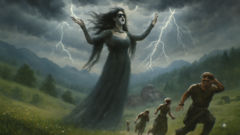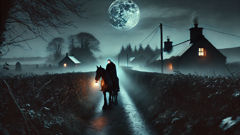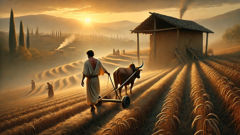Introduction
Tucked within the rugged folds of the Rhodope Mountains, where the air tastes of pine resin and the wind croons ancient songs, lies a world where myth and reality blend with every thunderclap. Here, the seasons are unruly artists: spring spills wildflowers across emerald slopes, summer glows with golden grains, and winter’s snows hush the valleys. But it’s the tempestuous days between, when clouds boil above the forests and shadows race over the fields, that people recall the legend of the Ala—a being both feared and revered in Bulgarian, Macedonian, and Serbian folklore. The Ala is no simple spirit. She is the mistress of hail, a female weather demon with eyes the color of slate and hair like streaming thunderclouds. Her arrival is heralded by a shifting in the wind, a sudden hush among the trees, and uneasy glances skyward from farmers whose harvests tremble on the brink of ruin. Villages huddle beneath thatched roofs, mothers whisper prayers, and men pace the edges of their wheat fields, scythes in hand, helpless against the might of weather. To some, the Ala is punishment—a force summoned by human greed or disrespect for the land. To others, she is a test, a challenge to courage and faith. But for one particular village, whose story threads through these ancient mountains, the Ala would become more than a distant threat. She would become a shadow over a life, a catalyst for transformation, and the source of a legend retold for generations. This is the tale of how one storm-swept summer changed the fate of a village forever—when a young woman named Rada met the Ala at the heart of a tempest, and dared to confront the spirit who commanded hailstones like soldiers. In the weaving of their destinies, hope would be kindled in the eye of the storm.
I. The Gathering Storm
In the heart of a summer that seemed to stretch toward infinity, the village of Krushina nestled on the mountain’s hip beneath a sky that was never truly blue nor entirely gray. For weeks, the villagers had watched the heavens with a wariness born of memory. The wheat was nearly ripe, stalks nodding in a breeze scented with thyme and woodsmoke, but every eye was drawn to the horizon, where thunderheads gathered like wolves. Rada, daughter of the village healer, moved between the rows of her family’s plot, her hands deft and sure as she inspected each bundle of grain. She was not afraid of much; orphaned by fever as a child, she’d grown up among whispered tales and hard work. Her mother, Baba Zoya, was a keeper of lore as well as herbs, and Rada had inherited both her stubbornness and her curiosity. Yet even Rada felt unease when, one afternoon, the air thickened and a hush fell over the meadows. Not a bird called. Not a leaf stirred. In that silence, the old women began to murmur. 'The Ala is near,' whispered Baba Zoya, her weathered hand clutching a sprig of rue. 'She comes when the fields are richest—when the people are proud and the land is thirsty.' The men gathered at the crossroads, arguing whether to ring the church bell or stoke smoky fires to ward off the spirit. Some sharpened sickles and muttered prayers. Children were called inside. Rada alone moved toward the forest’s edge, her heart beating with a strange mix of dread and fascination. She recalled the tales: The Ala who flew through stormclouds, her voice a banshee’s shriek, her fingers trailing ice. If you looked at her directly, your soul would freeze; if you cursed her name, she’d dance over your roof and leave ruin in her wake. Yet the land needed rain, not destruction. Standing beneath an ancient beech, Rada closed her eyes and listened—not to the wind, but to the silence beneath it. She felt the earth’s longing, the dry ache in its roots, the trembling in the air that was not quite thunder. When she opened her eyes, the first drops fell—cold, hard, sharp as pebbles. Hail. It struck the wheat and the wildflowers alike, shattering petals and bruising fruit. Above the fields, the clouds twisted into a figure—a woman towering and insubstantial, her hair streaming like torn banners, her mouth open in a soundless command. The Ala had arrived. Rada did not run. Instead, she shouted into the storm, her voice raw and fearless: 'Why do you torment us? What have we done to earn your wrath?' The wind whipped her words away, but the hail lessened for a moment—just long enough for Rada to feel the Ala’s attention, sharp and icy, settle on her. A sudden bolt of lightning split the sky, illuminating the demon’s face: beautiful and terrible, ageless as the stones. Their eyes met. In that instant, something passed between them—a challenge, or perhaps an invitation. The hail resumed, battering the fields and flattening the grain, but Rada stood firm until the storm moved on and the world stilled. The village was devastated. Crops were ruined, roofs battered, hope trampled into mud. Yet the villagers spoke in awe of Rada’s courage, and Baba Zoya wrapped her daughter in a cloak of pride and worry. 'You have drawn her notice,' she warned. 'The Ala does not forget those who defy her.' That night, as Rada lay sleepless beneath the eaves, she wondered whether she had angered the demon—or awakened something else entirely.
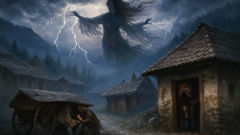
II. The Pact in the Forest
In the days that followed, Krushina was a village of wounds. Broken stalks lay scattered across the fields, animals huddled in their pens, and hunger cast its shadow longer than the clouds. Some villagers wept for lost grain, others cursed the capricious spirit. But Rada, restless and unable to accept defeat, listened to her mother’s tales for guidance. 'Long ago,' Baba Zoya said one night as she ground juniper berries in a wooden mortar, 'the Ala was not always cruel. Once, she was a guardian of the mountain’s balance. It is only when men forget to honor the land that she grows wrathful.' This thought grew roots in Rada’s mind. If the Ala could be appeased, perhaps there was hope for the next harvest. Or perhaps—if one dared—she could even be bargained with. On the third night after the storm, with the moon pale behind drifting clouds, Rada slipped from her home carrying a pouch of wild honey and a wreath of yarrow. She followed a deer path into the heart of the forest, feet silent on moss and loam. The woods were alive with nocturnal rustlings, but Rada pressed on until she reached a clearing where mist curled like breath and silence reigned. There she called out—not in anger, but in supplication: 'Ala, mistress of storms, I offer you honey for sweetness and yarrow for healing. Spare our fields, and I will honor your name as our mothers once did.' At first, there was only silence. Then a wind rose from nowhere, chilling the clearing. Shadows lengthened, and a figure stepped from the mist—not quite flesh, not quite cloud. The Ala appeared as a woman both young and ancient, her eyes deep pools of stormwater. Her presence pressed on Rada like a mountain, yet Rada did not kneel. 'You are brave,' the Ala said, her voice echoing like distant thunder. 'Few would stand before me. Fewer still would offer tribute.' Rada explained the village’s plight—the hunger, the sorrow, the old ways nearly forgotten. The Ala listened, inscrutable. 'What would you give for your people?' she asked at last. 'I would give myself,' Rada replied. 'I would serve as your voice among the living, teaching them to honor the land and its spirits.' The demon’s laughter was cold as sleet, yet not without respect. 'A bold offer. But service is not given lightly. If you take this path, you must walk it through storm and drought, feast and famine.' Rada nodded. 'I accept.' The pact was sealed not with blood, but with a breath—Rada inhaled the icy air as the Ala touched her brow with fingers like falling hail. In that moment, visions flooded her mind: fields golden under gentle rain, forests alive with birdsong, but also blighted earth and villages drowned in flood. The balance was fragile; to keep it required wisdom as well as courage. When Rada returned to Krushina at dawn, she bore no visible mark, but her eyes held the sheen of stormlight. The villagers sensed a change. Some avoided her; others sought her advice. Under her guidance, they began to restore old rituals: offerings of bread and honey at crossroads, prayers to the wind, and careful tending of every living thing. Gradually, the land responded. Green shoots pushed through battered earth, and wild herbs flourished where grain had failed. But peace was uneasy. The memory of hail lingered, and not all villagers trusted Rada’s newfound connection to the Ala. Whispers grew, suspicion smoldered, and in the heart of summer, another trial loomed—one that would test both Rada and the ancient pact she’d forged.
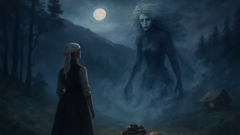
III. The Second Storm and the Test of Hearts
As the weeks unfurled into high summer, Krushina recovered its rhythm. The villagers grew accustomed to their rituals, some with sincerity, others out of habit or fear. Rada moved among them with new purpose, mediating disputes and healing sickness with wisdom that seemed to come from beyond herself. Yet beneath this fragile peace, something darkened. The village elder, Petar—once a friend to Rada’s family—began to stir unrest. He muttered that no good came from dealings with demons. That Rada had brought calamity, not spared it. Others, hungry for blame, listened. On a morning thick with heat and tension, Petar confronted Rada in the market square. 'You consort with spirits that care nothing for mortal lives,' he accused. 'You’ve brought the Ala’s gaze upon us, and now we are cursed.' Rada stood her ground, her voice steady. 'The Ala is not our enemy. She seeks balance, not destruction. We forgot to honor the land—now we must learn again.' But fear is stubborn, and words do little to sway a heart gripped by it. That afternoon, clouds gathered again, faster than before. The air tasted of copper; animals shied from their pens; even the bravest men paled as thunder rumbled. This time, Rada felt the storm’s coming like a chill in her bones. She knew: The Ala had returned—not in wrath, but to test the pact. As hail began to rattle against rooftops, Rada ran to the village square. The sky above boiled with black clouds, from which the Ala’s form descended—more vivid than before, her eyes alight with lightning. 'You called for me,' the Ala’s voice boomed above the tempest. 'You doubted the pact. Now you must prove your worth.' Petar fell to his knees, but Rada stepped forward. 'Test me, then,' she cried into the roar. The demon’s eyes narrowed. Hailstones grew larger, pounding earth and wood alike. Rada shielded a child with her own body; she urged villagers into cellars, guided animals into shelter. Through the chaos, she called on her connection with the Ala—not with fear, but with a plea for mercy and for understanding. At the storm’s heart, Rada felt herself lifted—her spirit drawn from her body and into the swirling clouds. She stood before the Ala atop an unseen peak, wind tearing at her hair and clothes. 'Why do you persist?' demanded the demon. 'Why risk everything for these people who fear you?' Rada’s answer was simple: 'Because they are my people. They are flawed, but so am I. We can learn.' The Ala studied her, eyes unfathomable. 'Would you suffer for their sake?' 'Yes.' 'Would you sacrifice your freedom?' 'If that is what it takes.' The storm quieted. The Ala extended her hand—a gesture both regal and tender. 'Then let us share the burden. Teach them as I taught you: that nature is not an enemy, but a partner.' As Rada accepted the Ala’s hand, a surge of energy flooded her—a mingling of human warmth and storm-cold power. She returned to herself on the ground as the last hailstone fell. The clouds began to part. The villagers emerged into sunlight, shaken but safe. Some knelt in gratitude; others stared at Rada with awe and fear in equal measure. Petar approached her, humbled. 'Forgive me,' he whispered. 'I did not understand.' Rada placed a hand on his shoulder. 'None of us did. Now we have a chance to do better.' From that day, the pact held. Rada became both guide and guardian—respected by those who once doubted her, feared by those slow to change, but always steadfast in her role as bridge between worlds. The Ala no longer haunted the fields as an enemy; her storms brought rain when needed, and her wrath was tempered by remembrance. Balance returned—not only to the land but to the hearts of those who called it home.
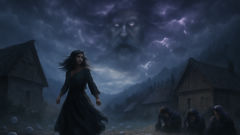
Conclusion
Years passed, and the story of Rada and the Ala became woven into the tapestry of Krushina’s life. The villagers learned to respect the rhythms of nature: they planted and harvested with care, offered thanks for rain and sun alike, and honored the invisible forces that shaped their world. Rada grew into a woman both wise and strong—her hair streaked with silver, her eyes reflecting storms and sunlight in turn. She never forgot her pact with the Ala, nor the lessons of humility and courage that came from standing in the path of hailstones. Children grew up hearing tales not just of fearsome demons, but of hope found in adversity and harmony restored through understanding. When storms swept across the mountains, no one hid in terror; instead, they watched and listened, remembering that balance was a dance—sometimes fierce, sometimes gentle. The Ala herself remained a mystery: sometimes glimpsed at dusk or in the flash of summer lightning, always more than mere myth. To some she was a warning; to others, a blessing. But to Rada and her people, she became a symbol—a reminder that nature’s power could be met not with defiance or submission alone, but with respect and care. And so, among the wildflowers and wheat of the Rhodope Mountains, the legend endured: that courage can turn even a storm’s fury into renewal, and that in honoring what is wild and ancient, we find our place in the world.

